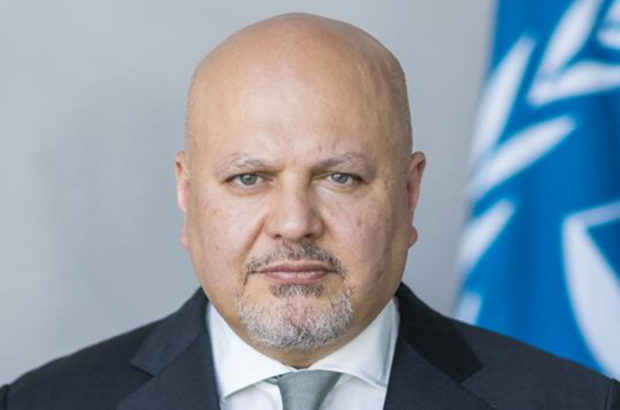
ICC prosecutor Karim Khan (Photo from the International Criminal Court)
MANILA, Philippines — The prosecutor of the International Criminal Court (ICC) has sought the dismissal of a request by the Philippine government for another suspension of his investigation of the charges of crimes against humanity against former President Rodrigo Duterte in his war on drugs that had killed thousands.
President Ferdinand Marcos Jr., who succeeded Duterte last year, questioned the ICC’s jurisdiction over the Philippines, telling reporters on Saturday that the ICC probe would be “an intrusion into our internal matters and a threat to our sovereignty.”
On Jan. 26, the ICC’s Pre-Trial Chamber (PTC) decided to authorize Prosecutor Karim Khan to resume his investigation, which it had suspended in November 2021 upon the request of the Duterte administration.
On Feb. 3, Solicitor General Menardo Guevarra requested the ICC to again suspend the probe pending a formal appeal to stop the investigation altogether. He also said he disagreed with and rejected the conclusions reached by the court in pursuing the probe.
He reiterated the official argument that the ICC no longer had any jurisdiction over the Philippines and that the government was already conducting its own probe of the drug war killings.
In his Feb. 16 response to Guevarra, Khan said the government “has not provided any argument substantiating its request” for another suspension of his probe or had shown that the implementation of the ICC’s Jan. 26 decision would create “an irreversible situation” or would be “difficult to correct.”
No progress
Khan also said that the resumption of his investigation would not defeat the purpose of any government appeal to drop the probe into the killings in Duterte’s war on drugs.
When he requested in June 2022 to be allowed to resume his investigation, Khan said that he saw no progress in the government’s own investigation of the bloody anti-drug campaign.
The PTC agreed with him.
It acknowledged the efforts made by the Philippine government but said these “do not sufficiently, or at all, mirror the Court’s investigation” of the drug war killings.
In its Jan. 26 decision authorizing the resumption of the probe, the PTC said it was “not satisfied that the Philippines is undertaking relevant investigations, or is making a real or genuine effort to carry out such investigations and any subsequent criminal prosecutions.”
Data from the Philippine Drug Enforcement Agency showed that 6,252 individuals were killed during the drug war from July 2016 to May 2022. Human rights groups say the figure could be three times more.
Extension granted
The ICC’s Appeals Chamber, meanwhile, granted the government’s request for an extension in the filing of its appeal brief against the investigation from Feb. 19 to March 13.
The Office of the Solicitor General explained that it was still awaiting updates from other government agencies on their investigations of the Duterte administration’s drug war.
It also said that it faced “challenges in gathering comprehensive data and relevant records due to logistical and administrative constraints” in view of the recent election of a new President and the appointment of new heads of agencies.
The Appeals Chamber said the government provided “valid reasons in support of its application” for an extension.
“In particular, it notes the new administration’s logistical and administrative constraints,” it said.
Long-held position
Replying to a reporter’s question regarding the ICC investigation of his predecessor’s antidrug campaign, Mr. Marcos said his position had not changed.
“I have stated it often even before I took office as President that there are many questions about their jurisdiction,” he said.
The ICC said its investigation will cover the period from Nov. 1, 2011, when the country ratified the Rome Statute that created the ICC and Duterte was still mayor of Davao City, to March 16, 2019, a day before the country’s withdrawal from the ICC, on his orders, took effect.
The President said he did not consider that a “legitimate judgment.”
The Duterte and the current administrations said that after the country withdrew from the Rome Statute, the ICC ceased having jurisdiction over the Philippines.
“So until those questions of jurisdiction and the effects on the sovereignty of the Republic are sufficiently answered, I cannot cooperate with them,” Mr. Marcos told reporters who traveled with him to Baguio City where he attended the Philippine Military Academy’s annual alumni homecoming.
SC support
The ICC position, however, was supported by the Supreme Court which said in a ruling in 2021 that withdrawing from the treaty “does not discharge a state party from the obligations it has incurred as a member.”
The President also said that “we have in our police, in our judiciary, a good system.”
“We do not need assistance from any outside entity. The Philippines is a sovereign nation and we are not colonies anymore of these former imperialists,” he said, referring to the international tribunal.
The court currently has 18 judges from various countries, including one each from Germany, Italy, Japan, United Kingdom, and France — the only countries that could possibly qualify as former “colonizers.”
The Rome Statute has 123 signatories — 33 African states, 19 from Asia Pacific, 18 from Eastern Europe, 28 from Latin America and the Caribbean, and 25 from Western Europe and other states.

